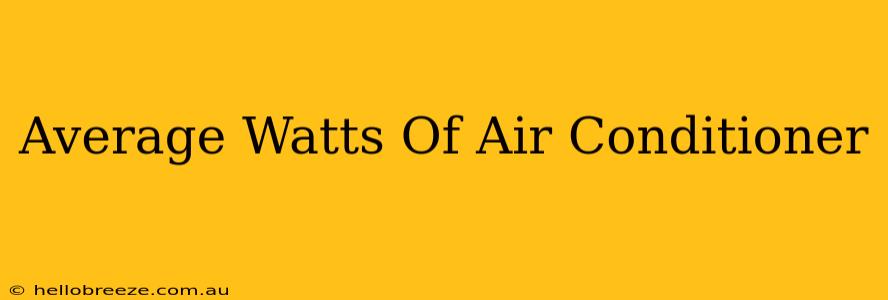Choosing the right air conditioner can be tricky, and understanding its power consumption is crucial for both your comfort and your wallet. This guide dives deep into the average wattage of air conditioners, helping you make an informed decision. We'll explore factors influencing wattage, how to calculate your needs, and energy-saving tips.
Understanding Air Conditioner Wattage
The wattage of an air conditioner refers to its power consumption, measured in watts (W). This indicates how much electricity the unit uses per hour. Higher wattage generally means more cooling power, but also higher energy bills. The average wattage varies significantly depending on several factors, which we'll explore below.
Factors Affecting Air Conditioner Wattage
Several key factors influence the wattage of an air conditioner:
-
Cooling Capacity (BTUs): British Thermal Units (BTUs) measure the cooling power. Higher BTU ratings require higher wattage. A typical window unit might range from 5,000 to 12,000 BTUs, with correspondingly varying wattage.
-
Energy Efficiency Rating (EER/SEER): The Energy Efficiency Ratio (EER) and Seasonal Energy Efficiency Ratio (SEER) indicate how efficiently the AC converts electricity into cooling. Higher EER/SEER ratings mean less wattage is needed for the same cooling power. Look for higher SEER ratings for better energy savings over the long term.
-
Air Conditioner Type: Different types of AC units—window units, split systems, portable units, and central AC—have varying wattage requirements due to differences in design and functionality. Central AC units, for example, tend to have much higher wattage than window units.
-
Features: Additional features like dehumidification, smart home integration, or inverter technology can affect the overall wattage consumption. Inverter technology, however, often leads to lower average wattage over time.
Average Wattage for Different AC Types
While there's no single "average," here's a general range for different air conditioner types:
-
Window Air Conditioners: Typically consume between 500 and 1500 watts. Smaller units will be closer to 500W, while larger, more powerful units will approach 1500W.
-
Portable Air Conditioners: Similar to window units, portable ACs usually range from 500 to 1500 watts, but their efficiency might be slightly lower.
-
Split System Air Conditioners: These range widely, depending on the size and cooling capacity. They generally consume more power than window or portable units, often in the range of 1000 to 5000 watts or more for larger systems.
-
Central Air Conditioners: Central AC systems are the most power-hungry, typically consuming 3000 to 5000 watts or more, depending on the size of your home and the unit's capacity.
Note: These are just estimates. The actual wattage will vary based on the specific model and the factors discussed above. Always check the manufacturer's specifications for exact wattage information.
Calculating Your Air Conditioning Wattage Needs
To determine the appropriate wattage for your needs, consider these factors:
-
Room Size: Larger rooms require more cooling power and therefore higher wattage.
-
Climate: Hotter and more humid climates require more powerful (and higher wattage) AC units.
-
Insulation: Properly insulated homes require less cooling, potentially leading to lower wattage needs.
-
Number of Windows and Doors: More windows and doors can impact cooling efficiency.
Consulting a professional HVAC technician is the best way to determine your precise needs and choose an appropriately sized and energy-efficient air conditioner.
Energy-Saving Tips for Lower Wattage Consumption
Regardless of your chosen unit, here are some energy-saving tips to reduce your air conditioner's wattage consumption and lower your electricity bills:
-
Regular Maintenance: Clean filters regularly to ensure efficient airflow and optimal performance.
-
Proper Insulation: Invest in proper home insulation to improve energy efficiency.
-
Strategic Window Treatments: Use curtains or blinds to block out sunlight and reduce heat gain.
-
Smart Thermostat: A programmable or smart thermostat can automate temperature settings, saving energy.
-
Seal Air Leaks: Seal any air leaks around windows and doors to prevent cold air from escaping and warm air from entering.
By carefully considering the wattage requirements and implementing energy-saving practices, you can select an air conditioner that meets your cooling needs while minimizing your environmental impact and energy expenses. Remember to always check the manufacturer's specifications for accurate wattage information and seek professional guidance when necessary.

